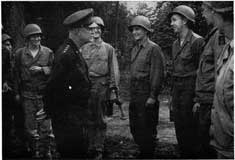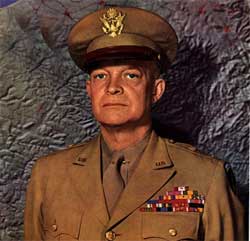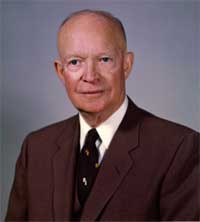Dwight David Eisenhower was the thirty-fourth President (1952-61) and a war hero. His presidency was marked by an end to the Korean War.

Born in Denison, Texas on October 14, 1890, two years later his poor family moved to Abilene, Kansas. Ike, as he was called, graduated from West Point Military Academy in 1914 as a second lieutenant and began a career that would rank him as one of the greatest military leaders of World War II.On July 1, 1916, Eisenhower married Mamie Geneva Doud, who was the daughter of a wealthy family in Denver, Colorado.

 Although he didn't see combat during World War I, he was decorated with the Distinguished Service Medal and promoted to lieutenant colonel because he successfully commanded several training camps. He, along with another famous war hero George Patton, was an advocate of mobile armored tactics. From 1922 to 1924 he was Executive Officer to General Fox Conner, Military Commander of the Panama Canal Zone. Subsequently, with the assistance of Fox, he attended Command and General Staff School where he graduated first in his class. He then served on the Battle Monuments Commission under General John Pershing, after which he studied at the Army War College then went on to serve in the office of the Assistant Secretary of War. Although he didn't see combat during World War I, he was decorated with the Distinguished Service Medal and promoted to lieutenant colonel because he successfully commanded several training camps. He, along with another famous war hero George Patton, was an advocate of mobile armored tactics. From 1922 to 1924 he was Executive Officer to General Fox Conner, Military Commander of the Panama Canal Zone. Subsequently, with the assistance of Fox, he attended Command and General Staff School where he graduated first in his class. He then served on the Battle Monuments Commission under General John Pershing, after which he studied at the Army War College then went on to serve in the office of the Assistant Secretary of War.
 A career military man, when World War II broke out, Eisenhower was appointed Chief of Staff of the Third Army. He was recognized as an ardent administrator, and politician. In 1943, he rose to Supreme Commander of Allied Expeditionary Forces in Europe. He oversaw the invasions of North Africa, Sicily, and Italy, and he announced the Italian surrender. He launched the Invasion of Normandy on D-day and oversaw the final defeat of Germany on May 8, 1945. After the war, Eisenhower served as President of Columbia University (1948-50), while remaining a military advisor. He rejected pleas of the Democratic Party to run for President in 1948. A career military man, when World War II broke out, Eisenhower was appointed Chief of Staff of the Third Army. He was recognized as an ardent administrator, and politician. In 1943, he rose to Supreme Commander of Allied Expeditionary Forces in Europe. He oversaw the invasions of North Africa, Sicily, and Italy, and he announced the Italian surrender. He launched the Invasion of Normandy on D-day and oversaw the final defeat of Germany on May 8, 1945. After the war, Eisenhower served as President of Columbia University (1948-50), while remaining a military advisor. He rejected pleas of the Democratic Party to run for President in 1948.
Eisenhower served as Army Chief of Staff and Chairman of the Joint Chiefs, working to achieve service unification and cooperation in the Department of Defense. In 1948, while doing this, he wrote "Crusade in Europe." President Truman named him Military Commander of NATO. He was stationed in Paris at the time where his great appeal enhanced his reputation throughout the Western World.
  Eisenhower resigned from the army in 1952 in order to make a bid for the presidency. He was so popular that both the Democrats and the Republicans wanted him as their candidate; but because of his own basic conservatism, he ran as a Republican. His campaign slogan was, "I like Ike," and America did. He and his Vice Presidential running mate, Richard Nixon, defeated the Democrat Adlai Stevenson in a landslide. Eisenhower resigned from the army in 1952 in order to make a bid for the presidency. He was so popular that both the Democrats and the Republicans wanted him as their candidate; but because of his own basic conservatism, he ran as a Republican. His campaign slogan was, "I like Ike," and America did. He and his Vice Presidential running mate, Richard Nixon, defeated the Democrat Adlai Stevenson in a landslide.
As President, Eisenhower's policies tended to be middle of the road, with compromises that pleased both parties. He and his Secretary of State, John Foster Dulles continued Harry Truman's policy of containing Communism. Eisenhower sent military advisors and aid to anti-Communist countries like South Vietnam. By threatening to use nuclear weapons, he forced China into an armistice, ending the Korean War. He issued the Eisenhower Doctrine to resist Communism in the Middle East. Although he believed Communism would fail on its own and that nuclear conflict was to be avoided at all costs, he enlarged the United States nuclear arsenal to include missiles carrying multiple armed warheads. When the Russians launched a satellite named "Sputnik" in 1956, Eisenhower thrust the United States into the space race.
Foreign affairs during the Eisenhower years were intense. At summit meetings in 1955 and 1960, Eisenhower, recognizing the nuclear threat, proposed an international Atoms for Peace Plan to reduce the arms race between the major countries. In l959 Fidel Castro seized control of the island of Cuba and set up a Communist regime there. Eisenhower responded with an embargo, or ban on trade. Just before he left office in l961, he broke off diplomatic relations with Cuba. A summit meeting in 1960 with Nikita Khrushchev ended abruptly when a U-2 spy plane was shot down over Russia, revealing that the United States had been spying on the Soviets with high altitude flights.
Domestically, things were a bit smoother. Ike served during a time of postwar prosperity. He expanded the policies of the New Deal in the domestic economy and instituted the most far-reaching Civil Rights reforms since Reconstruction. He secured the right of blacks to vote, and in 1957 he sent federal troops to Little Rock, Arkansas to enforce court ordered school desegregation. Eisenhower was fiscally conservative and believed in paying the national debt.

After his presidency, Eisenhower retired to his farm in Gettysburg, Pennsylvania, where he wrote his memoirs and several other books. He had several health problems including a heart condition and inflammatory bowel disease. He supported Richard Nixon his Vice-President for President against Kennedy. He died on March 28, 1969, in Washington DC after a long illness and was buried at Abilene, Kansas.
|

